The Rechabites are a biblical clan, the descendants of Rechab through Jehonadab.

The temperance movement is a social movement promoting temperance or total abstinence from consumption of alcoholic beverages. Participants in the movement typically criticize alcohol intoxication or promote teetotalism, and its leaders emphasize alcohol's negative effects on people's health, personalities, and family lives. Typically the movement promotes alcohol education and it also demands the passage of new laws against the sale of alcohol: either regulations on the availability of alcohol, or the prohibition of it.
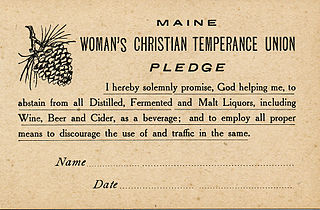
Abstinence pledges are commitments made by people, often though not always teenagers and young adults, to practice abstinence, usually in the case of practicing teetotalism with respect to abstaining from alcohol and other drugs, or chastity, with respect to abstaining from sexual intercourse until marriage; in the case of sexual abstinence, they are sometimes also known as purity pledges or virginity pledges. They are most common in the United States among Catholic and Evangelical Christian denominations, while others are nonsectarian.

Sobriety is the condition of not having any effects from alcohol and other drugs. Sobriety is also considered to be the natural state of a human being at birth. A person in a state of sobriety is considered sober. Organizations of the temperance movement have encouraged sobriety as being normative in society.
The International Organisation of Good Templars, whose international body is known as Movendi International, is a fraternal organization which is part of the temperance movement, promoting abstinence from alcohol and other drugs.
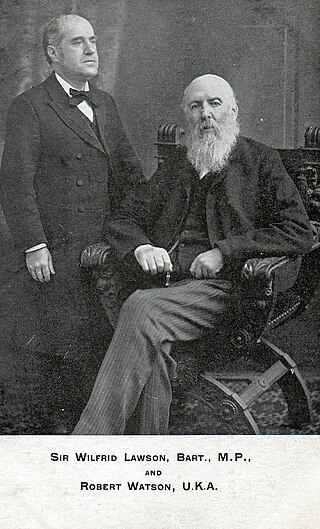
The United Kingdom Alliance (UKA) was a British temperance organisation. It was founded in 1853 in Manchester to work for the prohibition of the trade in alcohol in the United Kingdom. This occurred in a context of support for the type of law passed by General Neal Dow in Maine, United States, in 1851, prohibiting the sale of intoxicants.
A fraternal order is a voluntary membership group organised as an order, with an initiation ritual and traits alluding to religious, chivalric or pseudo-chivalric orders, guilds, or secret societies. Fraternal orders typically have secular purposes, serving as social clubs, cultural organizations and providing a form of social welfare through reciprocal aid or charitable work. Many friendly societies, benefit societies and mutual organisations take the form of a fraternal order.
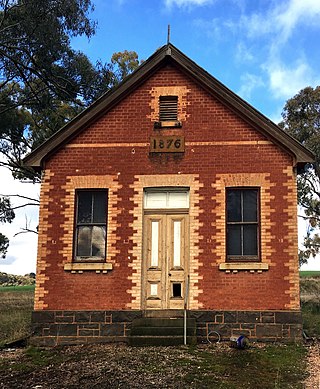
Bung Bong is a locality in Victoria between the towns of Avoca and Maryborough. The locality is divided, with the Western section in the Pyrenees Shire and the Eastern section in Shire of Central Goldfields. The Bet Bet Creek runs towards the north through the middle of the locality and then into the Loddon River. Bung Bong is located on the Pyrenees Highway.

Samuel Bowly (1802–1884) was an English abolitionist and temperance advocate.
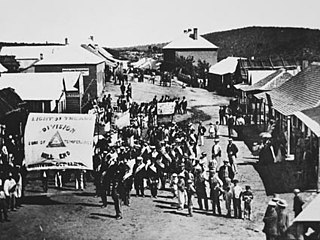
The temperance movement has been active in Australia. As with the movement internationally, in Australia it has sought to curb the drinking of alcohol. The temperance movement had some success in the early twentieth century, although from the Second World War its influence declined. Nevertheless, temperance organisations remain active today.

The temperance movement in New Zealand originated as a social movement in the late-19th century. In general, the temperance movement aims at curbing the consumption of alcohol. Although it met with local success, it narrowly failed to impose national prohibition on a number of occasions in the early-20th century. Temperance organisations remain active in New Zealand today.
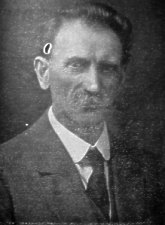
Christopher R. Shimmin (1870–1933) was a Manx playwright and a member of the House of Keys.

Healthy Investment is a British mutual friendly society that provides a range of ethical With-profits savings and investment products. It was originally formed in 1835 as Independent Order of Rechabites, and traded until 2004 as The Rechabite Friendly Society. As of 2018 it had more than 100,000 members and looked after over £115m of members' money.

Teetotalism is the practice of voluntarily abstaining from the consumption of alcohol, specifically in alcoholic drinks. A person who practices teetotalism is called a teetotaler (US) or teetotaller (UK), or said to be teetotal. Globally, in 2016, 57% of adults did not drink alcohol in the past 12 months, and 44.5% had never consumed alcohol. A number of temperance organisations have been founded in order to promote teetotalism and provide spaces for nondrinkers to socialise.
The Golden Age of Fraternalism is a term referring to a period when membership in the fraternal societies in the United States grew at a very rapid pace in the latter third of the 19th century and continuing into the first part of the 20th. At its peak, it was suggested that as much as 40% of the adult male population held membership in at least one fraternal order.
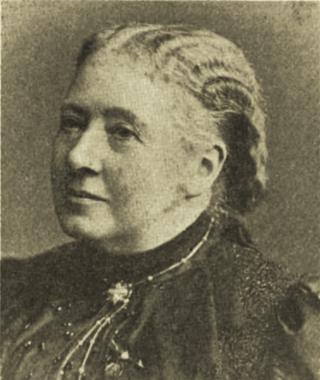
Elizabeth Philippa Biddulph, Baroness Biddulph was an English humanitarian and temperance leader. She published a biography of her father, Charles Yorke, 4th Earl of Hardwicke, and was appointed a Woman of the Bedchamber by Queen Victoria.

Alice Brown Caine was an English temperance leader. She served as president of the Women's Total Abstinence Union, the Liverpool Ladies' Temperance Association, and the Deaconesses' National Total Abstinence League.

Peter Turner Winskill was an English temperance reformer and historian.
















